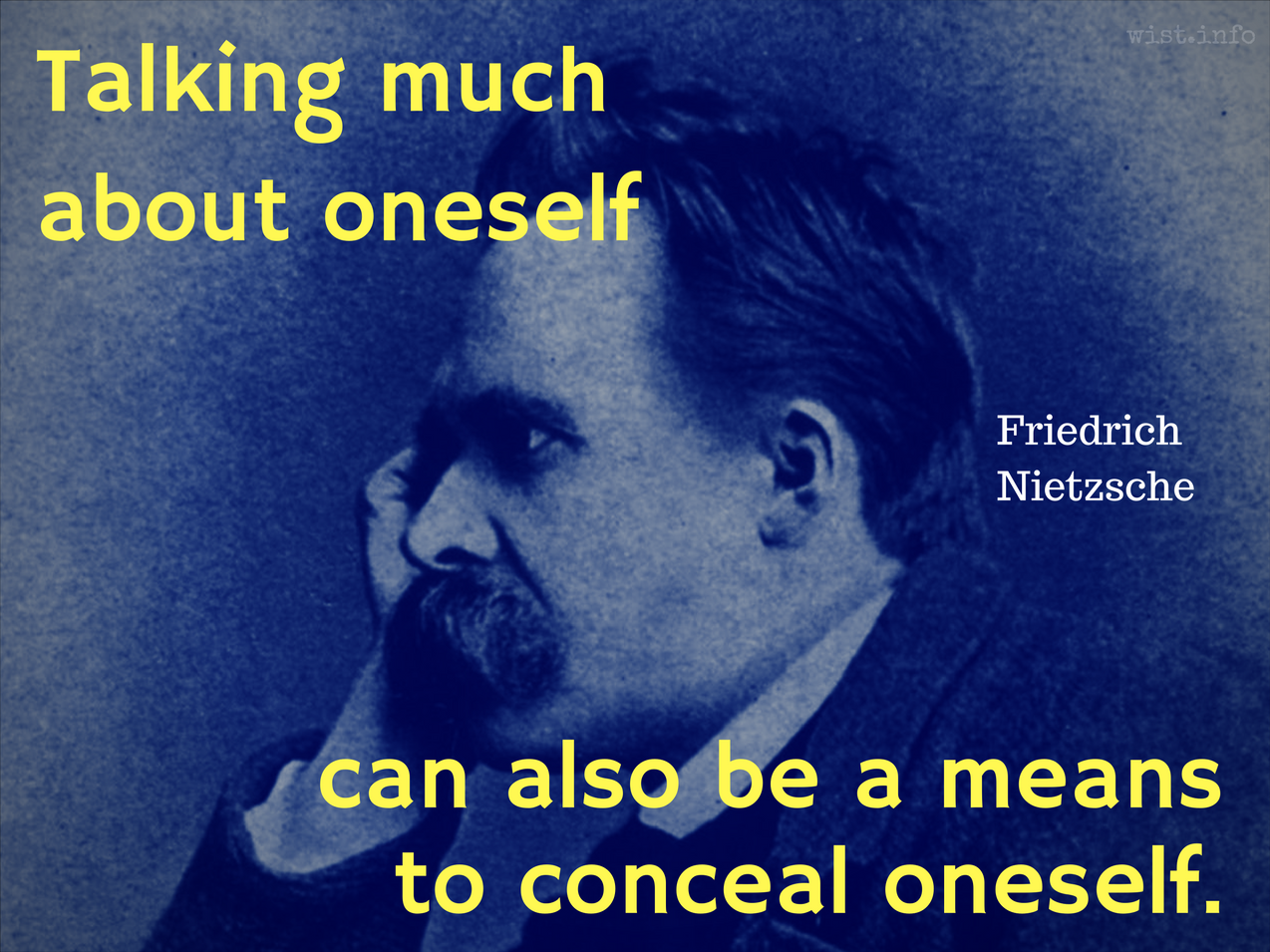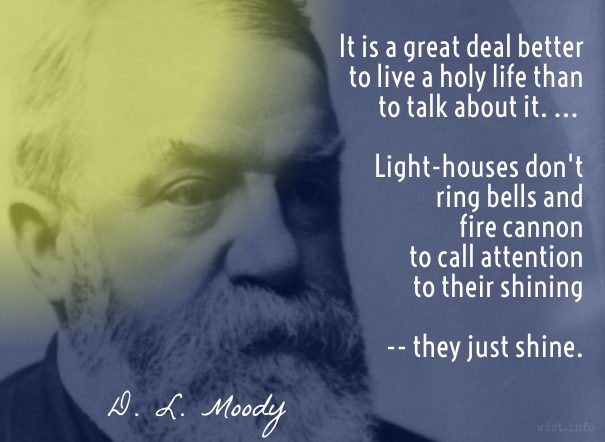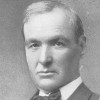Proclaim not all thou knowest, all thou owest, all thou hast, nor all thou canst.
Benjamin Franklin (1706-1790) American statesman, scientist, philosopher, aphorist
Poor Richard (1739 ed.)
(Source)
Quotations about:
bragging
Note not all quotations have been tagged, so Search may find additional quotes on this topic.
CLÉANTE: There’s true and false in piety, as in bravery,
And just as those whose courage shines the most
In battle, are the least inclined to boast,
So those whose hearts are truly pure and lowly
Don’t make a flashy show of being holy.[Il est de faux dévots ainsi que de faux braves:
Et, comme on ne voit pas qu’où l’honneur les conduit
Les vrais braves soient ceux qui font beaucoup de bruit,
Les bons et vrais dévots, qu’on doit suivre à la trace,
Ne sont pas ceux aussi qui font tant de grimace.]Molière (1622-1673) French playwright, actor [stage name for Jean-Baptiste Poquelin]
Tartuffe, or the Hypocrite [Le Tartuffe, ou L’Imposteur], Act 1, sc. 6 (1669) [tr. Wilbur (1963)]
(Source)
(Source (French)). Alternate translations:There are Pretenders to Devotion as well as to Courage. And as we never find the truly Brave to be such as make much Noise wheresoever they are led by Honour, so the Good and truly Pious, who are worthy of our Imitation, are never those that deal much in Grimace.
[tr. Clitandre (1672)]There are hypocrites in religion as well as pretenders to courage; and as we never find the truly brave man make much noise where honour leads him, no more are the good and truly pious, whom we ought to follow, those who make so many grimaces.
[tr. Van Laun (1876)]Devotion, like courage, has its pretenders' and in the same way that the truly brave are not those who make the most noise where honour leads them, so the real and truly pious men whose example we ought to follow, are not those who affect such grimaces.
[tr. Wall (1879)]There are hypocrites in religion as well as pretenders to courage; and as we never find the truly brave to be such as make much noise wherever they are led. by honour, so the good and truly pious, who are worthy of our imitation, are never those who indulge in much show.
[tr. Mathew (1890)]There are pretenders to devotion as to courage; and even as those who are truly brave when honour calls are not those who make the most noise, so the good and truly pious, in whose footsteps we ought to follow, are not thoae who make so many grimaces.
[tr. Waller (1903), sc. 5]There are false heroes -- and false devotees;
And as true heroes never are the ones
Who make much noise about their deeds of honour,
Just so true devotees, whom we should follow,
Are not the ones who make so much vain show.
[tr. Page (1909)]There's false devotion like false bravery.
And as you see upon the field of honor
The really brave are not the noisiest ones,
The truly pious, whom we should imitate,
Are not the ones who show off their devotion.
[tr. Bishop (1957), sc. 5]Like courage, piety has its hypocrites.
Just as we see, where honor beckons most
The truly brave are not the ones who boast;
The truly pious people, even so,
Are not the ones who make the biggest show.
[tr. Frame (1967). sc. 5]If there's false courage, then, God knows,
There is false piety as well:
The brave man you can always tell
By how he doesn't rant and roar
And bluster, in the heat of war.
How may pious men be known?
They don't pull faces, sigh and groan.
[tr. Bolt (2002)]Look: some people pretend to be religious the way others pretend to be brave. We can recognize brave people by what honor has pushed them to do, but the truly pious, whom one should imitate, don't smirk and show off.
[tr. Steiner (2008)]The falsely devout are like the falsely brave;
And as we see that those who make the most noise
Are not the bravest when the moment comes,
So the truly good, the truly devout,
Are not the ones making all this racket about it.
[tr. Campbell (2013)]
(He and his shadow dance together. He is showing off now. He crows like a cock. He would fly in order to impress WENDY further if he knew that there is anything unusual in that.)
PETER: Wendy, look, look; oh the cleverness of me!
J. M. Barrie (1860-1937) Scottish novelist and dramatist [James Matthew Barrie]
Peter Pan, Act 1 (1904, pub. 1928)
(Source)
In Barrie's 1911 novelization, Peter and Wendy, ch. 3 "Come Away, Come Away!" this is rendered:Alas, he had already forgotten that he owed his bliss to Wendy. He thought he had attached the shadow himself. “How clever I am!” he crowed rapturously, “oh, the cleverness of me!”
There are such things as to speak well, to speak easily, to speak correctly, and to speak seasonably. We offend against the last way of speaking if we mention a sumptuous entertainment we have just been present at before people who have not had enough to eat; if we boast of our good health before invalids; if we talk of our riches, our income, and our fine furniture to a man who has not so much as an income or a dwelling; in a word, if we speak of our prosperity before people who are wretched; such a conversation is too much for them, and the comparison which they then make between their condition and ours is very painful.
[Il y a parler bien, parler aisément, parler juste, parler à propos. C’est pécher contre ce dernier genre que de s’étendre sur un repas magnifique que l’on vient de faire, devant des gens qui sont réduits à épargner leur pain; de dire merveilles de sa santé devant des infirmes; d’entretenir de ses richesses, de ses revenus et de ses ameublements un homme qui n’a ni rentes ni domicile; en un mot, de parler de son bonheur devant des misérables: cette conversation est trop forte pour eux, et la comparaison qu’ils font alors de leur état au vôtre est odieuse.]
Jean de La Bruyère (1645-1696) French essayist, moralist
The Characters [Les Caractères], ch. 5 “Of Society and Conversation [De la Société et de la Conversation],” § 23 (5.23) (1688) [tr. Van Laun (1885)]
(Source)
(Source (French)). Alternate translations:Some men talk well, easily, justly, and to the purpose: those offend in the last kind, who speak of the Banquets they are to be at, before such as are reduc'd to spare their Bread; of sound Limbs, before the Infirm; of Demesnes and Revenues, before the Poor and Needy; of fine Houses and Furniture, before such as have neither Dwelling or Moveables: in a word, who speak of Prosperity, before the Miserable. This conversation is too strong for 'em, and the comparison you make between their condition and yours is odious.
[Bullord ed. (1696)]There is speaking well, speaking easily, speaking justly, and speaking seasonably: 'Tis transgressing the last rule, to speak ofthe sumptuous Entertainments you have made, before such as are reduc'd to want of Bread; of a healthy Constitution of Body, before the Infirm; of Demesnes, Revenues and Furniture, before a Man who has neither Dwelling, Rents, nor Movables; in a word, to speak of your Prosperity before the Miserable: this Conversation is too strong from them, and the Comparison they make between their Condition and yours is odious.
[Curll ed. (1713)]There is speaking well, speaking easily, speaking justly, and speaking seasonably: It is offending against the last, to speak of Entertainments before the Indigent; of sound Limbs and Health before the Infirm; of Houses and Lands before one who has not so much as a Dwelling; in a Word, to speak of your Prosperity before the Miserable; this Conversation is cruel, and the Comparison which naturally rises in them betwixt their Condition and yours is excruciating.
[Browne ed. (1752)]There is a difference between speaking well, speaking easily, speaking with judgement and speaking opportunely. We fail in this last respect when we enlarge upon the splendid meal we have just enjoyed in front of people who have to be thrifty of their bread; or boast of our health in the presence of invalids; or talk about our wealth, our fortune and property to a man who has neither home nor income; in a word, when we speak of our happiness in front of those who are wretched; such conversation is too painful for them, and the comparison they are bound to make between your state and their own is intolerable.
[tr. Stewart (1970)]
Can I forget your many favours? Nay.
Why don’t I mention them? Because you do.
If I begin, some one is sure to say
“Your patron told me all he did for you”;
Friend there are tasks cannot be done by two;
Shall this be yours or mine? for I submit
However great a gift, there nothing due
To any giver who shall boast of it.[Quae mihi praestiteris memini semperque tenebo.
Cur igitur taceo, Postume? Tu loqueris.
Incipio quotiens alicui tua dona referre,
Protinus exclamat ‘Dixerat ipse mihi.’
Non belle quaedam faciunt duo: sufficit unus
Huic operi: si vis, ut loquar, ipse tace.
Crede mihi, quamvis ingentia, Postume, dona
Auctoris pereunt garrulitate sui.]Martial (AD c.39-c.103) Spanish Roman poet, satirist, epigrammatist [Marcus Valerius Martialis]
Epigrams [Epigrammata], Book 5, epigram 52 (5.52) (AD 90) [tr. Pott & Wright (1921), “Self-Praise”]
(Source)
"To Postumus." (Source (Latin)). Alternate translations:Thy gifts to me I thinke of, and still shall.
Why then do I not speake of them at all?
Thou dost. Where ere I tell thy charitie,
Tis answer'd straight, himselfe has told it me.
This work befits not both; one is enough;
If thou wouldst have me speake, be silent thou.
For (trust me) wert thou nere so liberall,
The givers talking would destroy it all.
[tr. May (1629), ep. 53]What thou conferr'st on me I do
Remember, and shall think on, too.
Why therefore do I hold my tongue?
Cause, Posthumus, thou ne'er hast done.
As often as I go to treat
of these thy gifts to them I meet,
'T is presently replied, "Forbear,
He whisper'd it into my ear."
Two men some things cannot do well:
One person may suffice to tell,
and do this work: if it may please
That I shall speak, then hold thy peace.
For prithee, Postumus, believe,
Though that thy gifts are great to give
All thanks must perish, and are lost,
When authors their own actions boast.
[tr. Fletcher (1656)]Your favors to me I remember well;
But do not mention them; because you tell.
Whenever I begin, I'm answer'd strait,
"I heard from his own mouth, what you relate."
Two ill become the business of but one;
Be you but silent, I will speak alone.
Great are your gifts; but when proclaim'd around,
The obligation dies upon the sound.
[tr. Hay (1755), ep. 53]The services you have rendered me I do not forget, and will always keep them in my mind. How happens it, Posthumus, that I am silent? It is because you talk. Do I begin to expatiate on your favours, I am told, "I heard all about it from himself." Some things are not handsomely performed by two; one person is enough to relate kindness; if you wish me to speak, you must remain silent. The merit of gifts, however great they be, is lost by the garrulity of the giver.
[tr. Amos (1858), ch. 3, ep. 78; ep. 53]Your services to me I remember, and shall never forget Why then am I silent about them, Postumus? Because you yourself talk of them. Whenever I begin to speak to any one of your favours, he immediately exclaims, "He has told me of them himself." There are certain things which cannot be well done by two people; one is enough in this case. If you wish me to speak, keep silence yourself. Believe me, Postumus, gifts, however great, are deprived of their value by garrulity on the part of the donor.
[tr. Bohn's Classical (1859)]I'm grateful for your favors;
They'll never be forgot.
You wonder why I'm dumb about 'em?
Just because you're not.
Whenever I start telling
Of kindnesses you'd done,
The tale, I find, you'd quite concluded
Long ere I'd begun.
Now two men spoil the business
That one does well alone.
If I 'm desired to open my mouth,
Kindly shut your own.
[tr. Nixon (1911)]Your bounty to me I remember and shall always keep in mind. Why, then, and I silent about it, Postumus? You speak of it. As often as I begin to report to someone your presents, he at once exclaims, "He himself had told me." These are things which two persons do not do nicely: one suffices for this work' if you want me to speak, be you yourself silent. Trust me; gifts, however great, Postumus, lose their value by the chattering of the giver.
[tr. Ker (1919)]Grateful for all your gifts I still shall be;
"Why then be silent?" Well, you speak for me.
If to a friend your kindness I report,
With, "Yes, he told me so" he cuts me short.
Some tasks are not so suitable for two,
So thank you, Postumus, I'll wait for you.
Believe me, gifts, however rich they be,
Lose all their value by loquacity.
[tr. Francis & Tatum (1924), #251]I remember all you have done for me and shall ever keep it in mind. Why then do I say nothing about it, Postumus? You talk. Whenever I start to tell somebody of your generosity, he exclaims at once: "He tole me that himself." Some things are not nicely done by two. One is enough for this work. If you want me to talk, you must hold your tongue. Believe me, Postumus, the most magnificent of gifts are nullified by the garrulity of the giver.
[tr. Shackleton Bailey (1993)]You are my patron, I would give you praise,
But when talk of your virtues I would raise,
I'm told you have already laid them out.
Where I would whisper, you your merits shout.
We must more prudently divide our labor
To have efficient impact on our neighbor.
If I'm to praise you, you must hold your peace,
Or give me from my gratitude release.
Your gifts do not give me the power to do
Promotion constantly undone by you.
You undermine my prized veracity
With puffings of your own loquacity.
[tr. Wills (2007)]I'll always cherish what you’ve done for me.
Why don’t I speak of it? Because you do.
Whenever I tell someone of your bounty,
he cries at once: “He told me of it, too!”
Some things two can’t do well; just one suffices.
You must keep mum, if you want me to gush.
Believe me, Postumus, the greatest gifts
are canceled when the giver just won't hush.
[tr. McLean (2014)]About your gifts I'd love to gush,
Instead, I feel I have to hush.
When I tell people, they don't doubt it:
You've already bragged about it.
Maybe we should coordinate
Who praises your largesse of late.
But gifts do lose their gleam and such
When givers praise themselves too much.
[tr. Hill (2023)]
When a man boasts, it is an indication he holds his listener in higher esteem than he does himself.
Marcelene Cox (1900-1998) American writer, columnist, aphorist
“Ask Any Woman” column, Ladies’ Home Journal (1955-06)
(Source)
You’re rich and young, as all confess,
And none denies your loveliness;
But when we hear your boastful tongue
You’re neither pretty, rich, nor young.[Bella es, novimus, et puella, verum est,
Et dives, quis enim potest negare?
Sed cum te nimium, Fabulla, laudas,
Nec dives neque bella nec puella es.]Martial (AD c.39-c.103) Spanish Roman poet, satirist, epigrammatist [Marcus Valerius Martialis]
Epigrams [Epigrammata], Book 1, epigram 64 (1.64) (AD 85-86) [tr. Pott & Wright (1921), “The Boaster”]
(Source)
"To Fabulla." (Source (Latin)). Alternate translations:Of beautie braue we knowe thou art,
and eke a maide beside:
Abounding eke in wealthe and store,
this ne maie bee denied.
But while to much you praise your self,
and boste you all surmount:
Ne riche, ne faire, Fabulla, nor
A maide we can you counte.
[tr. Kendall (1577)]You're fayre, I know't; and modest too, 't is true;
And rich you are; well, who denyes it you?
But whilst your owne prayse you too much proclame,
Of modest, rich, and fayre you loose the same.
[17th C Manuscript]Faire, rich, and yong? how rare is her perfection,
Were it not mingled with one soule infection?
I meane, so proud a heart, so curst a tongue,
As makes her seeme, nor faire, nor rich, nor yong.
[tr. Harington (fl. c. 1600), ep. 291; Book 4, ep. 37 "Of a faire Shrew"]Th' art faire Fabulla, tis most true,
Rich, yongue, there's none denies thy due.
But whilest thy selfe dost too much boast,
Thy youth, thy wealth, thy beautie's lost.
[tr. May (1629)]Genteel 't is true, O nymph, you are;
You're rich and beauteous to a hair.
But while too much you praise yourself,
You've neither air, nor charms, nor pelf.
[tr. Gent. Mag. (1746)]Pretty thou art, we know; a pretty maid!
A rich one, too, it cannot be gainsay'd.
But when thy puffs we hear, thy pride we see;
Thou neither rich, nor fair, nor maid canst be.
[tr. Elphinston (1782), Book 6, Part 3, ep. 48; Bohn labels this as Anon.]You are pretty, -- we know it; and young, --it is true; and rich, -- who can deny it? But when you praise yourself extravagantly, Fabulla, you appear neither rich, nor pretty, nor young.
[tr. Bohn's Classical (1859)]Fabulla, it's true you're a fair ingénue,
And your wealth is on every one's tongue:
But your loud self-conceit
Makes people you meet
Think you neither fair, wealthy, nor young.
[tr. Nixon (1911), "The Egoist"]You are beautiful, we know, and young, that is true, and rich -- for who can deny it? But while you praise yourself overmuch, Fabulla, you are neither rich, nor beautiful, nor young.
[tr. Ker (1919)]You’re beautiful, oh yes, and young, and rich;
But since you tell us so, you’re just a bitch.
[tr. Humphries (1963)]It's true enough, Fabulla, you are
by you, Fabulla, you aren't rich, or beautiful, or young.
Bovie (1970)]That you're young, beautiful and rich,
Fabulla, no one can deny.
But when you praise yourself too much,
None of the epithets apply.
[tr. Michie (1972)]You're beautiful, oh yes, and young, and rich;
But since you tell us so, you're just a bitch.
[tr. Humphries (<1987)]You are pretty: we know. You are young: true. And rich: who can deny it? But when you praise yourself too much, Fabulla, you are neither rich nor pretty nor young.
[tr. Shackleton Bailey (1993)]You're rich, and young, and beautiful!
It's true, and who can doubt it?
But less and less we feel that pull
The more you talk about it.
[tr. Ericsson (1995)]Of debutantes you are beyond compare --
So wealthy, beautiful, and debonair.
Yet you make all this matter not a whit:
Your beauty to undo -- you boast of it.
[tr. Wills (2007)]You’re lovely, yes, and young, it’s true,
and rich -- who can deny your wealth?
But you aren’t lovely, young or rich,
Fabulla, when you praise yourself.
[tr. McLean (2014)]
Be your character what it will, it will be known; and nobody will take it up on your own word. Never imagine that anything you can say yourself will varnish your defects or add lustre to your perfections! but, on the contrary, it may, and nine times in ten will, make the former more glaring, and the latter obscure.
Lord Chesterfield (1694-1773) English statesman, wit [Philip Dormer Stanhope]
Letter to his son, #166 (19 Oct 1748)
(Source)
There is another sort of lies, inoffensive enough in themselves, but wonderfully ridiculous; I mean those lies which a mistaken vanity suggests, that defeat the very end for which they are calculated, and terminate in the humiliation and confusion of their author, who is sure to be detected. These are chiefly narrative and historical lies, all intended to do infinite honor to their author. He is always the hero of his own romances; he has been in dangers from which nobody but himself ever escaped; he as seen with his own eyes, whatever other people have heard or read of; he has had more bonnes fortunes than ever he knew women; and has ridden more miles post in one day, than ever courier went in two. He is soon ridiculed, and as soon becomes the object of universal contempt and ridicule.
Lord Chesterfield (1694-1773) English statesman, wit [Philip Dormer Stanhope]
Letter to his son, #126 (21 Sep 1747)
(Source)
In artful boasting, one states all the information necessary to impress people, but keeps the facts decently clothed in the language of humility. Useful approaches include Disbelief, Fear and Manic Elation. For some reason, these are considered to be more attractive human emotions than justifiable pride or self-satisfaction. Probably because they are not as much fun.
The less you speak of your greatness, the more I will think of it.
Francis Bacon (1561-1626) English philosopher, scientist, author, statesman
Remark to Sir Edward Coke
(Source)
Quoted in Joseph Sortain, The Life of Francis, Lord Bacon (1851).
Bragging is not merely designed to impress. Bragging is designed to produce envy and assert superiority. It is, therefore, an act of hostility. Bragging is also a transparent ploy. It reveals your lack of self-confidence. “I am not enough,” you feel. So you resort to showering me with your “achievements,” in order to mask your perceived deficiencies.
Aaron Hass (contemp.) American clinical psychiatrist, academic, author
Doing the Right Thing: Cultivating Your Moral Intelligence, Sec. 1, ch. 7 “Self-Control” (1998)
(Source)
HENRY: This story shall the good man teach his son;
And Crispin Crispian shall ne’er go by
From this day to the ending of the world,
But we in it shall be remember’d, —
We few, we happy few, we band of brothers.
For he to-day that sheds his blood with me,
Shall be my brother; be he ne’er so vile,
This day shall gentle his condition:
And gentlemen in England, now a-bed,
Shall think themselves accurs’d, they were not here,
And hold their manhoods cheap, whiles any speaks,
That fought with us upon Saint Crispin’s day.William Shakespeare (1564-1616) English dramatist and poet
Henry V, Act 4, sc. 3, l. 58ff (4.3.58-69) (1599)
(Source)
In our judgment of men, we are to beware of giving any great importance to occasional acts. By acts of occasional virtue weak men endeavour to redeem themselves in their own estimation, vain men to exalt themselves in that of mankind.
Henry Taylor (1800-1886) English dramatist, poet, bureaucrat, man of letters
The Statesman: An Ironical Treatise on the Art of Succeeding, ch. 3 (1836)
(Source)
Most people have a furious itch to talk about themselves and are restrained only by the disinclination of others to listen. Reserve is an artificial quality that is developed in most of us but as the result.
W. Somerset Maugham (1874-1965) English novelist and playwright [William Somerset Maugham]
The Summing Up, ch. 19 (1938)
(Source)
Glorious men are the scorn of wise men, the admiration of fools, the idols of parasites, and the slaves of their own vaunts.
Francis Bacon (1561-1626) English philosopher, scientist, author, statesman
“Of Vain-Glory,” Essays, No. 54 (1625)
(Source)
Whoo-oop! I’m the old original iron-jawed, brass-mounted, copper-bellied corpse-maker from the wilds of Arkansaw. — Look at me! I’m the man they call Sudden Death & General Desolation! Sired by a hurricane, dam’d by an earthquake, half-brother to the cholera, nearly related to the small-pox on the mother’s side! Look at me! I take nineteen alligators and a bar’l of whiskey for breakfast when I’m in robust health, and a bushel of rattlesnakes and a dead body when I’m ailing! I split the everlasting rocks with my glance, and I squench the thunder when I speak! Whoo-oop! Stand back and give me room according to my strength! Blood’s my natural drink, and the wails of the dying is music to my ear! Cast your eye on me, gentlemen! — and lay low and hold your breath, for I’m bout to turn myself loose!
PAROLLES: Who knows himself a braggart,
Let him fear this; for it will come to pass
That every braggart shall be found an ass.William Shakespeare (1564-1616) English dramatist and poet
All’s Well That Ends Well, Act 4, sc. 3, l. 356ff (4.3.356-358) (1602?)
(Source)
Do you wish people to think well of you? Don’t speak well of your-self.
[Voulez-vous qu’on croie du bien de vous? N’en dites point.]
It is a great deal better to live a holy life than to talk about it. We are told to let our light shine, and if it does, we won’t need to tell anybody it does. Light-houses don’t ring bells and fire cannon to call attention to their shining — they just shine.
Man is always looking for someone to boast to; woman is always looking for someone to complain to.
It is far more impressive when others discover your good qualities without your help.
Judith Martin (b. 1938) American author, journalist, etiquette expert [a.k.a. Miss Manners]
(Attributed)
Widely attributed to Martin, but no citeable source found. Some sources point to Reader's Digest which, on research, was not helpful.
This sad little lizard told me that he was a Brontosaurus on his mother’s side. I did not laugh; people who boast of ancestry often have little else to sustain them. Humoring them costs nothing and adds to happiness in a world in which happiness is in short supply.
You should show the least vanity about your greatest gifts. Content yourself with doing: leave saying to others.
[Afecte menos sus mayores eminencias. Conténtese con hacer, y deje para otros el decir.]
Baltasar Gracián y Morales (1601-1658) Spanish Jesuit priest, writer, philosopher
The Art of Worldly Wisdom [Oráculo Manual y Arte de Prudencia], § 295 (1647) [tr. Maurer (1992)]
(Source)
(Source (Spanish)). Alternate translations:Shew as little as thou canst thy most eminent qualities. Rest satisfied to doe, and leave it to others to talk of it.
[Flesher ed. (1685)]The greater your exploits the less you need affect them: content yourself with doing, leave the talking to others.
[tr. Jacobs (1892)]Real achievement needs no such affectation. Rest in accomplishment, and leave talk to others. Do, and do not brag.
[tr. Fischer (1937)]Make the least ado about your greatest gifts. Be content to act, and leave the talking to others.
[Source]
Be wiser than other people, if you can; but do not tell them so.
Lord Chesterfield (1694-1773) English statesman, wit [Philip Dormer Stanhope]
Letter to his son, #104 (29 Nov 1745)
(Source)
Of all the horrid, hideous notes of woe,
Sadder than owl songs or the midnight blast,
Is that portentous phrase, “I told you so,”
Utter’d by friends, those prophets of the past,
Who, ‘stead of saying what you now should do,
Own they foresaw that you would fall at last.
Even in common people, conceit has the virtue of making them cheerful; the man who thinks his wife, his baby, his house, his horse, his dog, and himself severally unequalled, is almost sure to be a good-humored person, though liable to be tedious at times.
Oliver Wendell Holmes, Sr. (1809-1894) American poet, essayist, scholar
Article (1857-11), “The Autocrat of the Breakfast-Table,” Atlantic Monthly
Collected in The Autocrat of the Breakfast-Table, ch. 1 (1858)
GLENDOWER: I can call spirits from the vasty deep.
HOTSPUR: Why, so can I, or so can any man;
But will they come when you do call for them?William Shakespeare (1564-1616) English dramatist and poet
Henry IV, Part 1, Act 3, sc. 1, l. 55ff (3.1.55-57) (1597)
(Source)

































